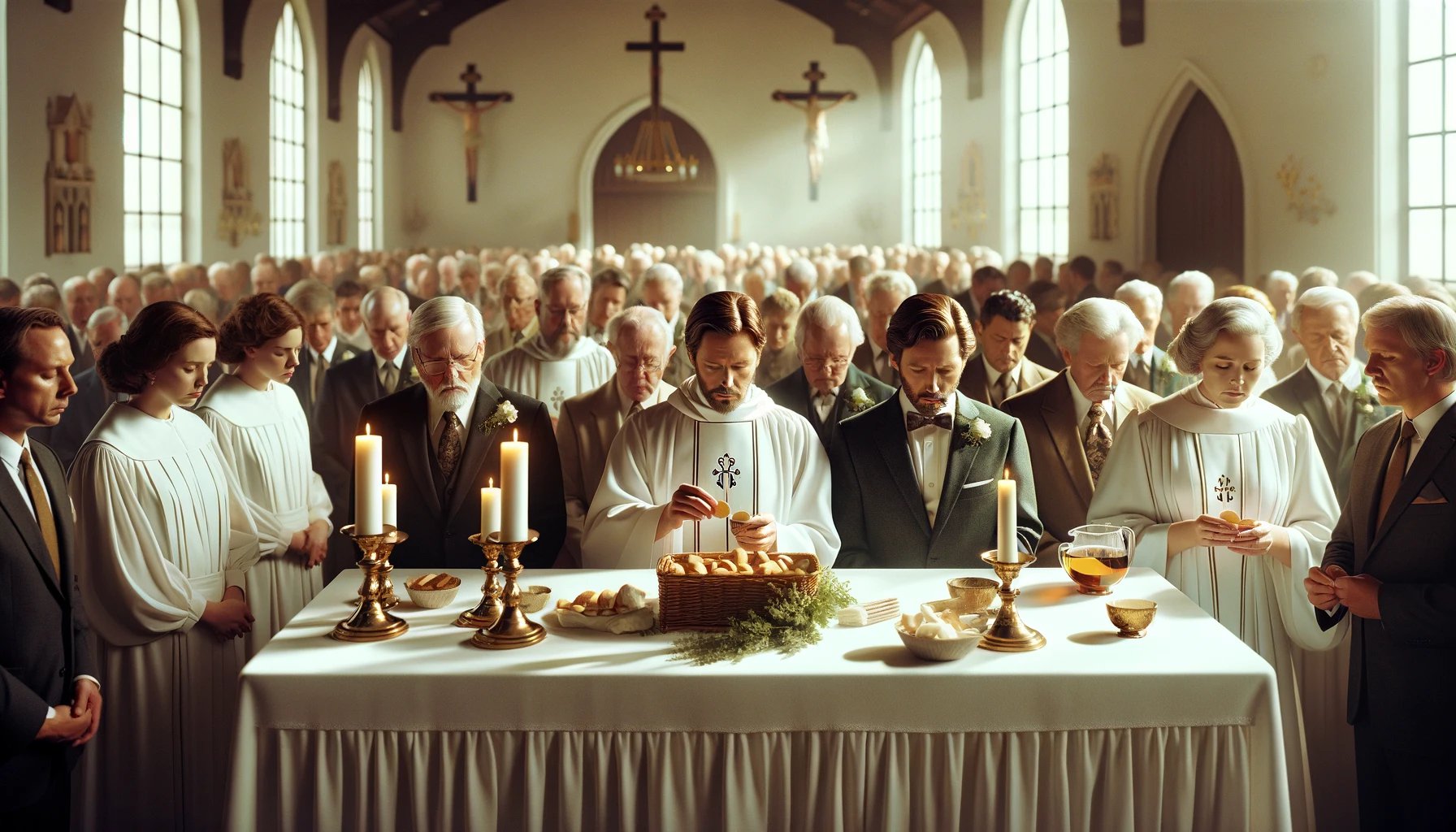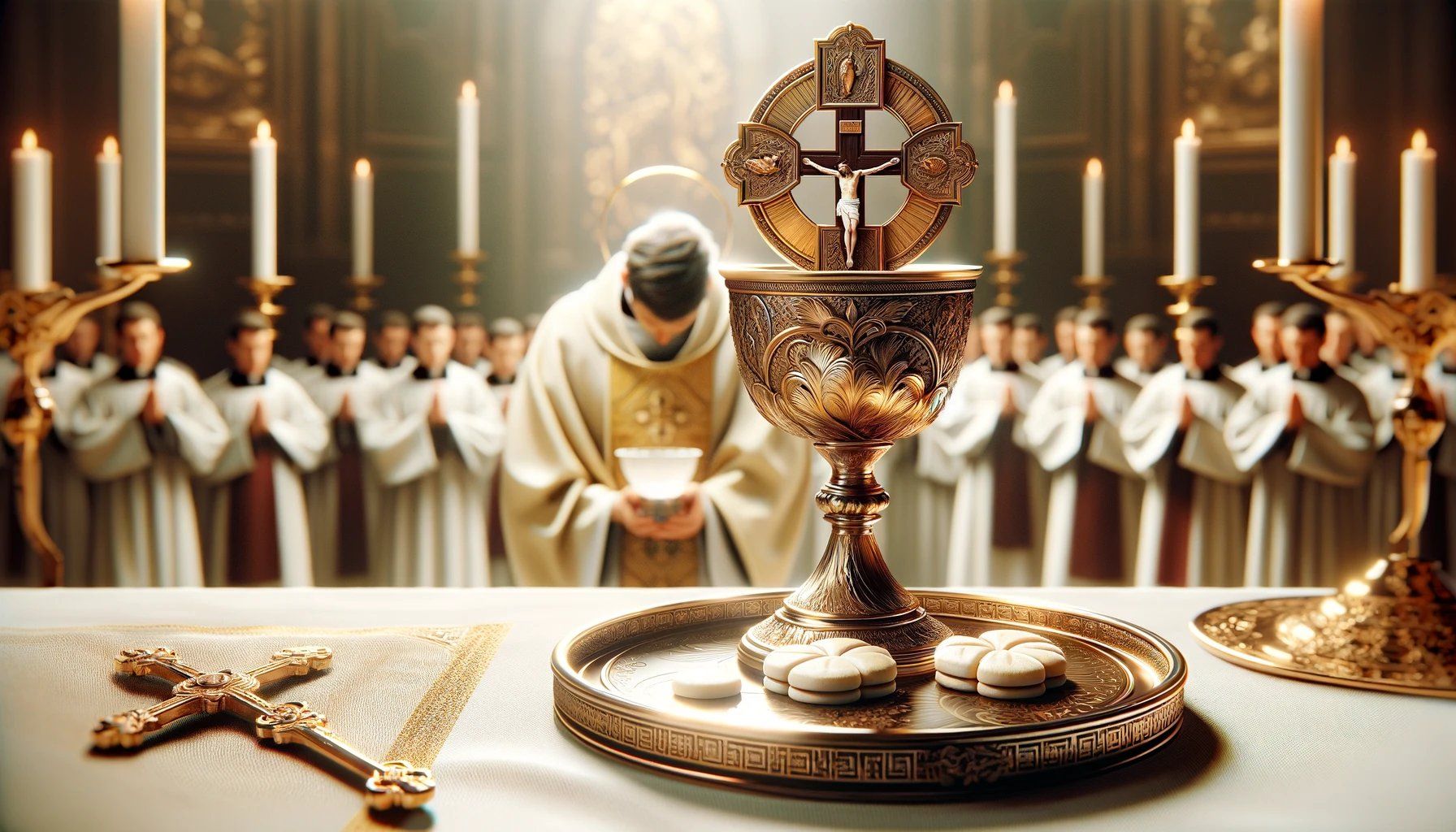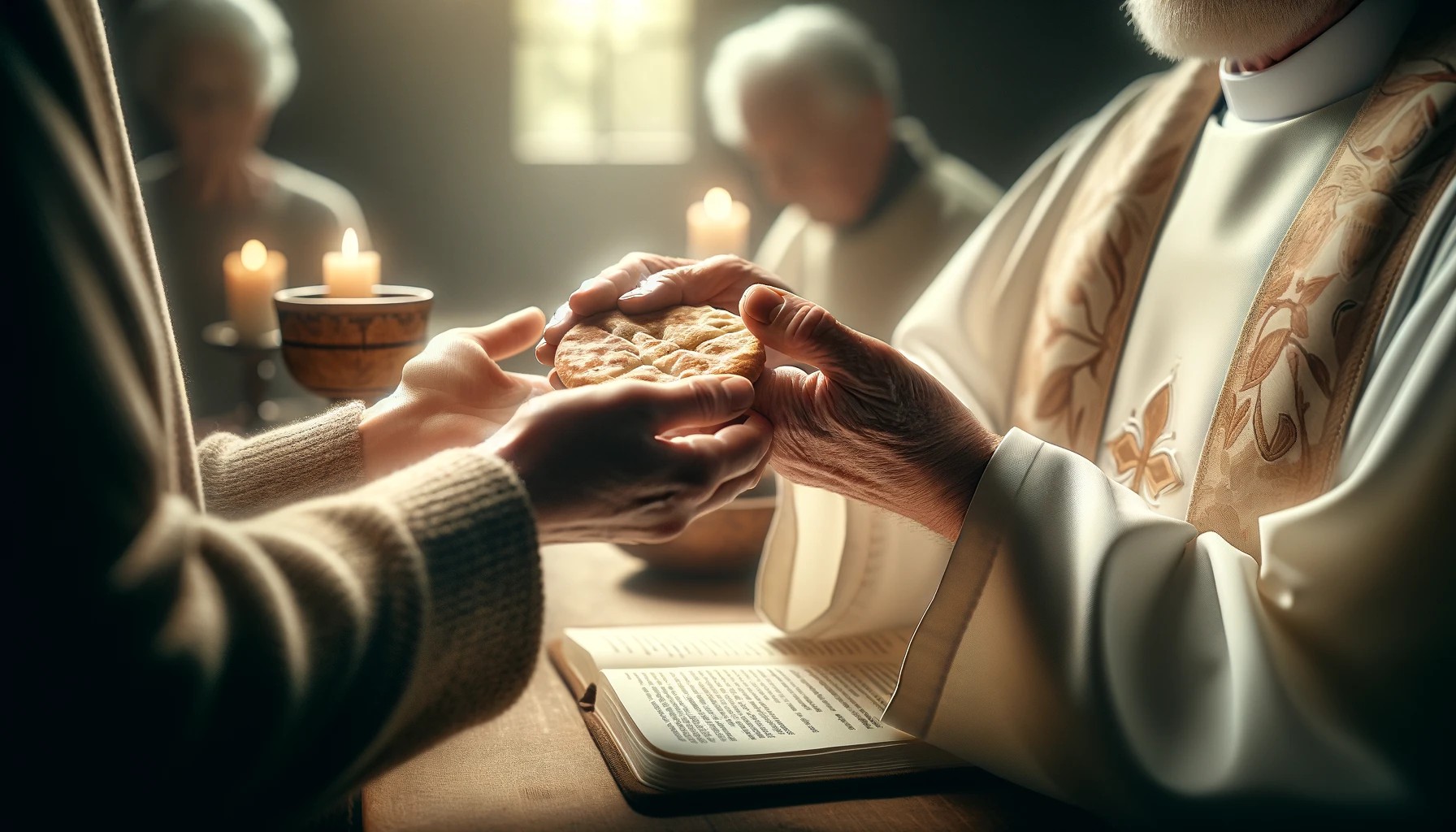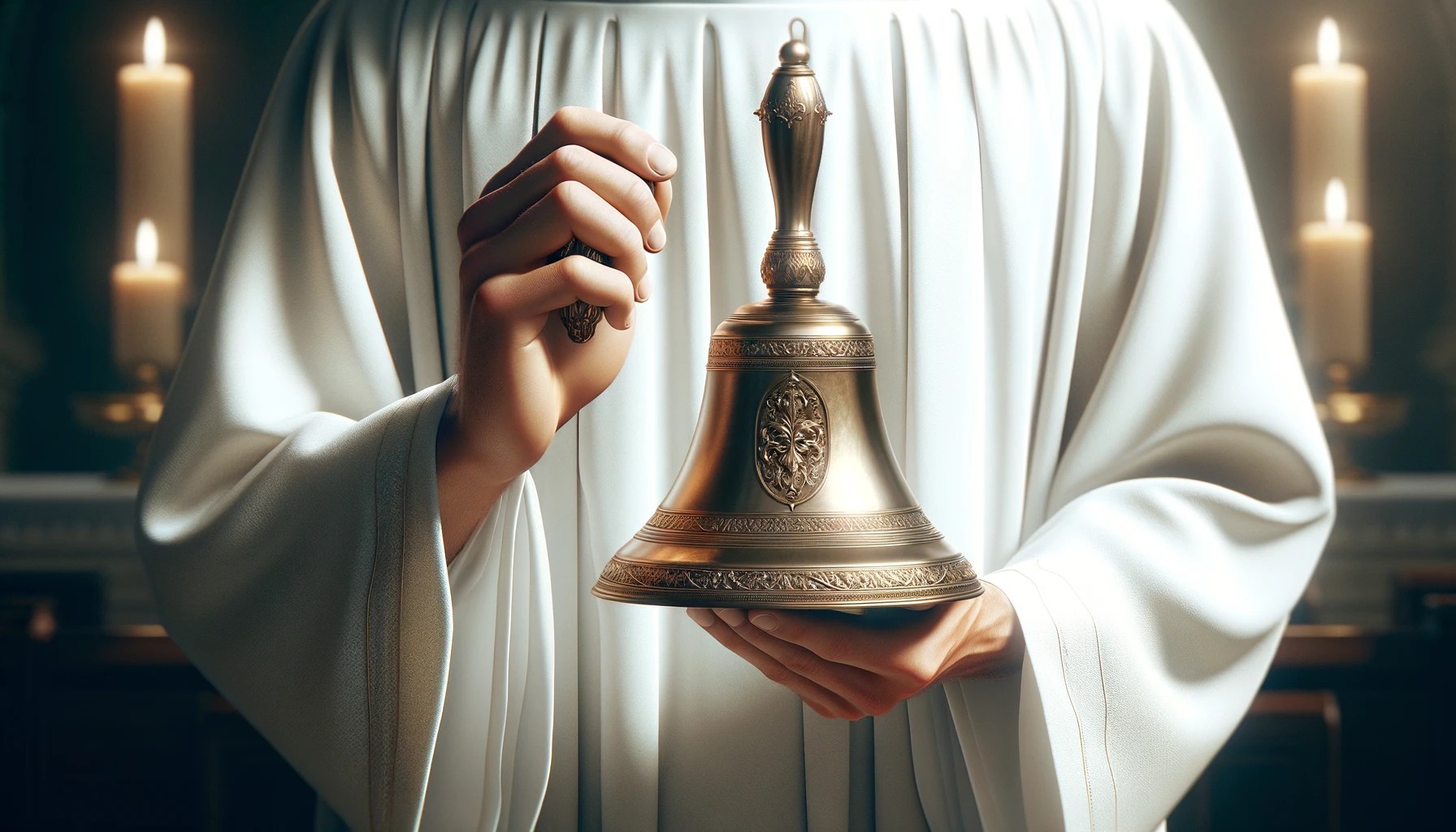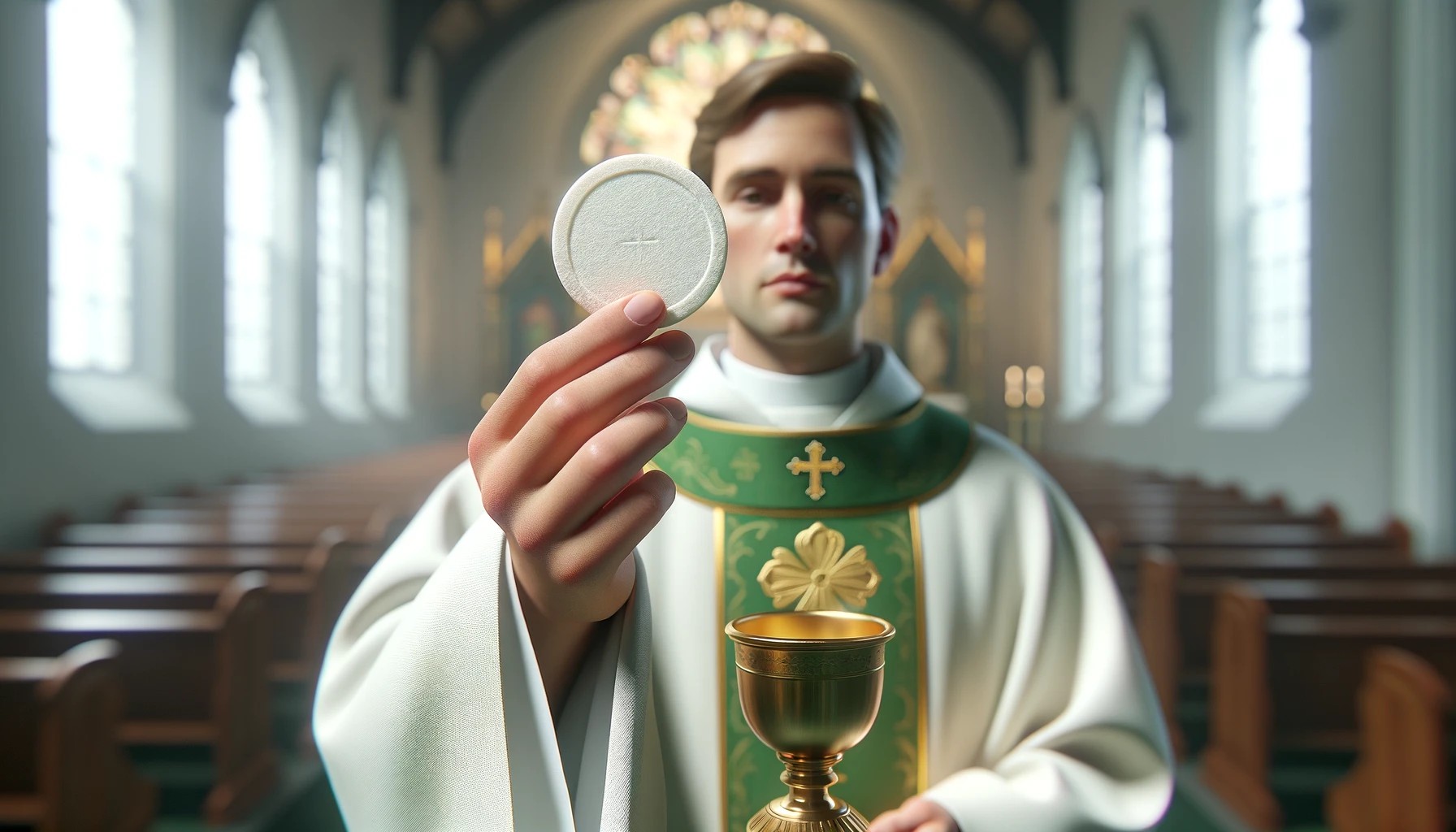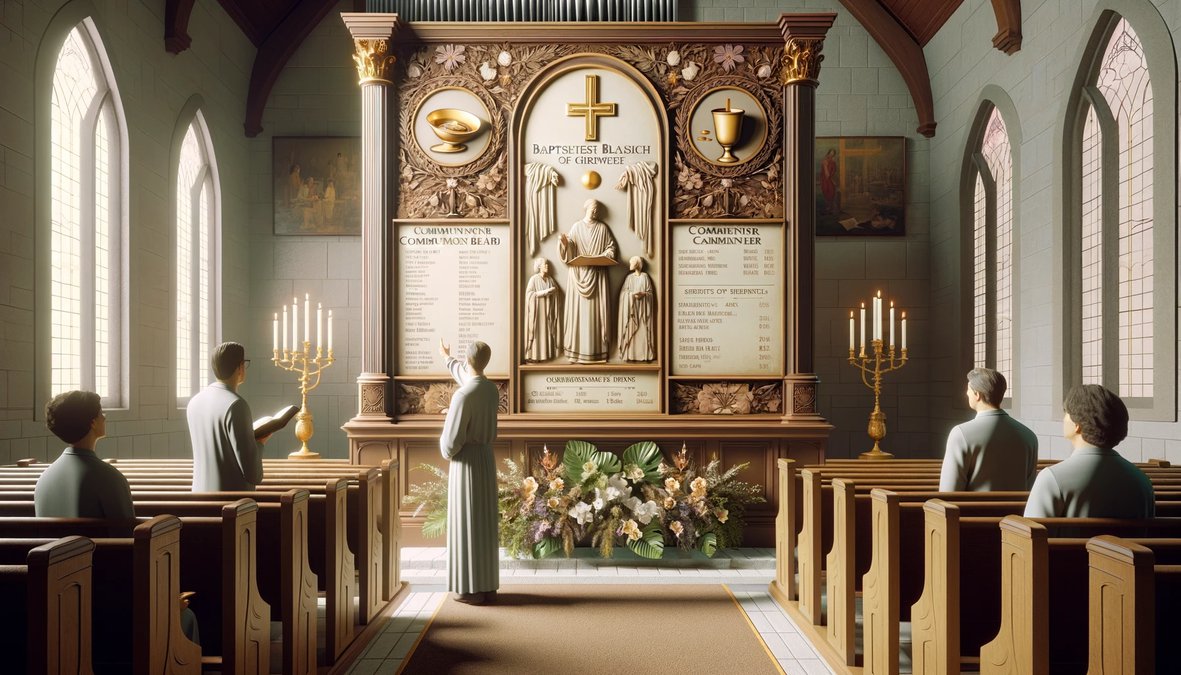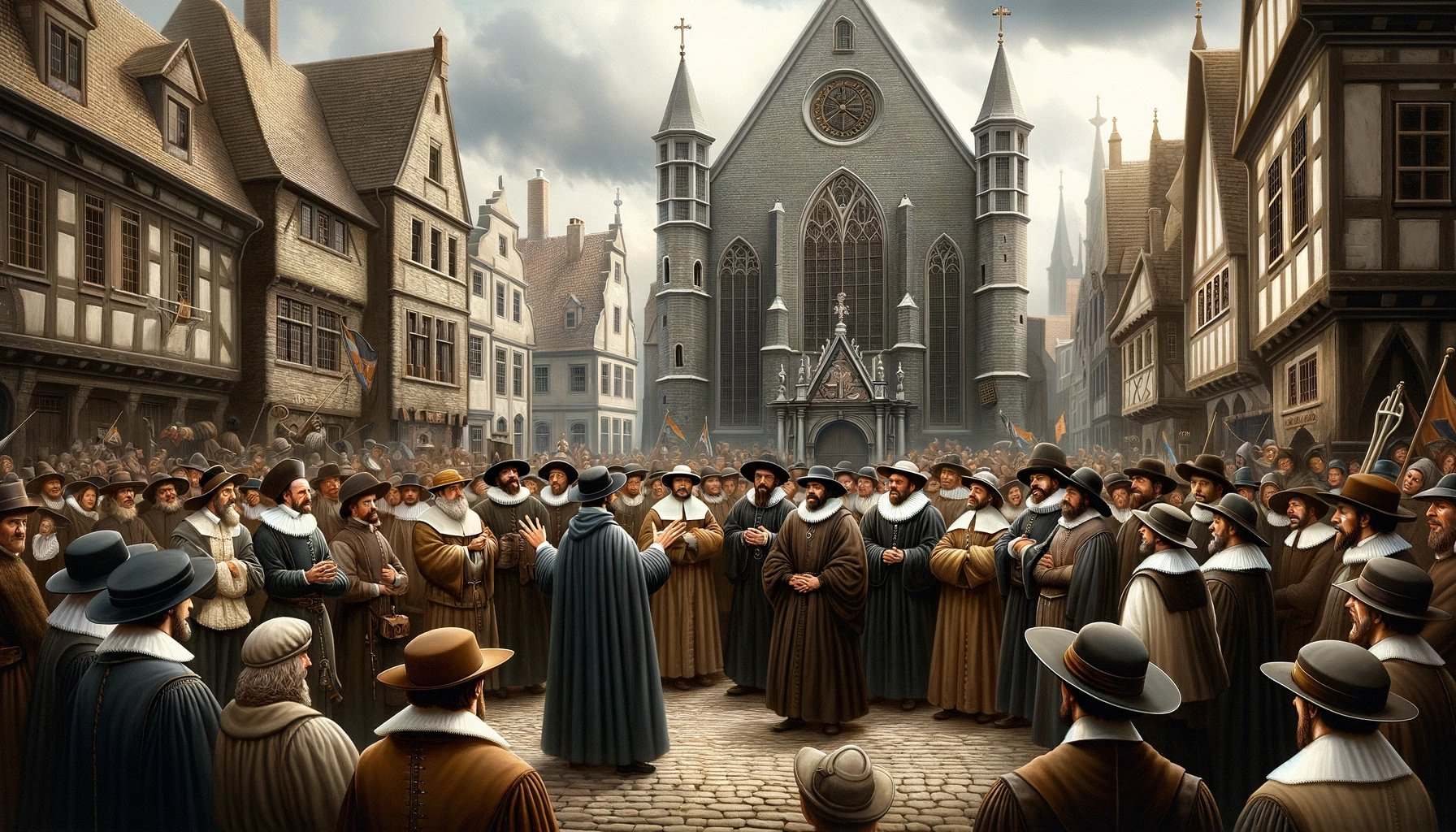Home>Theology and Spirituality>Why Do Catholics Take Communion
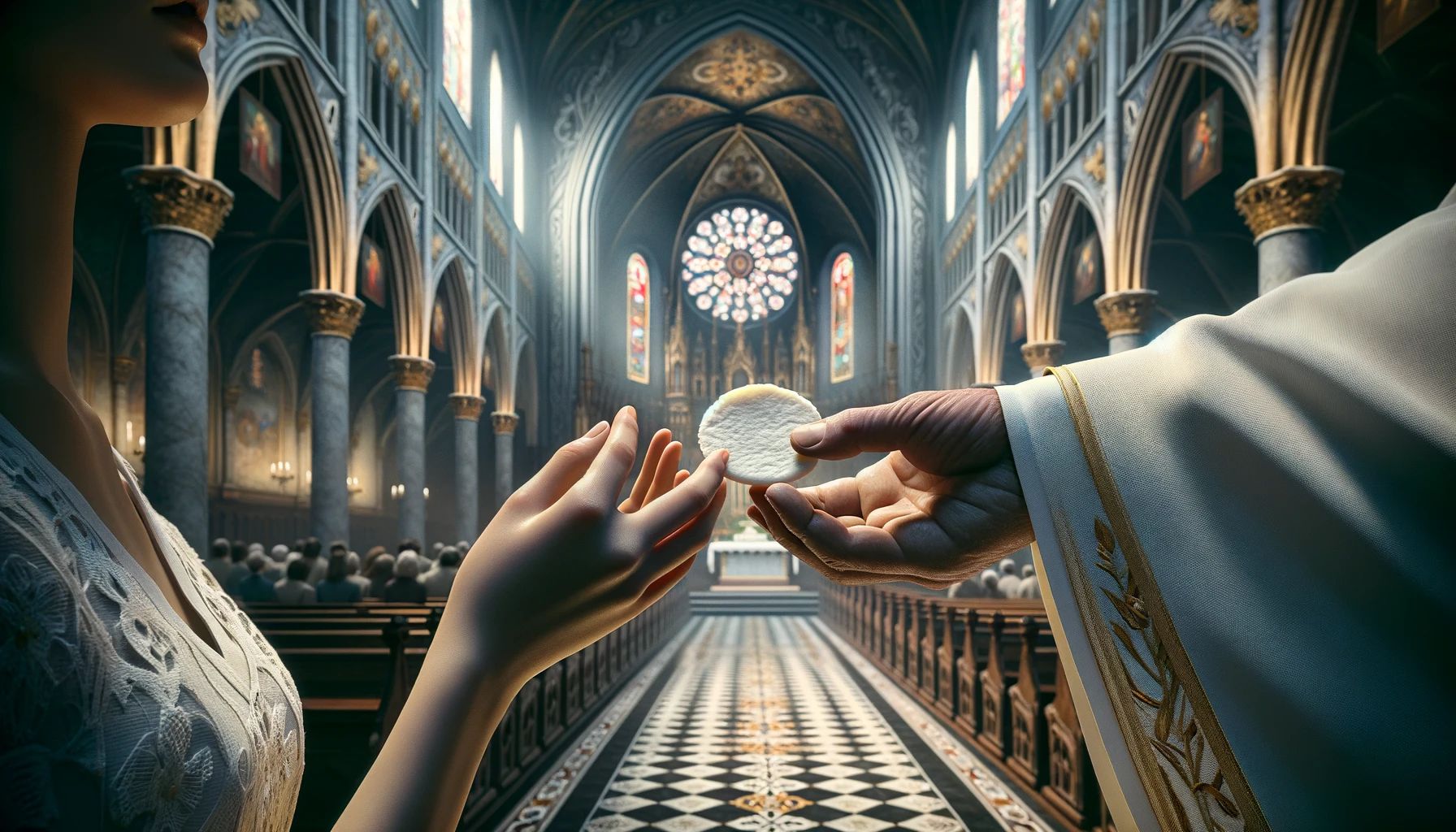

Theology and Spirituality
Why Do Catholics Take Communion
Published: February 24, 2024
Jason DeRose, Managing Editor at Christian.net, uses his expertise in religion and journalism to deepen understanding of faith's societal impacts. His editorial leadership, coupled with a strong academic background, enriches the platform’s diverse content, earning him recognition in both journalism and religious circles.
Discover the significance of communion in the Catholic faith and its role in theology and spirituality. Learn why Catholics take communion and its spiritual importance.
(Many of the links in this article redirect to a specific reviewed product. Your purchase of these products through affiliate links helps to generate commission for Christian.net, at no extra cost. Learn more)
Table of Contents
Introduction
Communion, also known as the Eucharist, holds profound significance within the Catholic faith. It is a sacred ritual that symbolizes the spiritual nourishment and unity of believers with Christ and one another. Understanding why Catholics take communion requires delving into the theological, symbolic, and spiritual dimensions of this practice.
The act of receiving communion is a central aspect of Catholic worship and spirituality. It is a solemn and reverent observance that has been upheld for centuries, carrying deep theological meaning and spiritual resonance. The Eucharist is not merely a symbolic gesture but is believed to be the actual body and blood of Jesus Christ, a concept known as transubstantiation.
To comprehend the importance of communion in Catholicism, one must explore its rich symbolism, its biblical foundation, and its role in the celebration of the Mass. Moreover, understanding the spiritual significance of partaking in the Eucharist sheds light on its transformative power in the lives of believers.
In this article, we will delve into the multifaceted aspects of communion in the Catholic tradition, shedding light on its theological underpinnings, its symbolism, and its role in fostering spiritual communion with Christ and the community of believers. By exploring these dimensions, we can gain a deeper appreciation for why Catholics hold the act of communion in such high regard and why it remains a cornerstone of their faith and worship.
Read more: Why Can Lutherans Take Catholic Communion
The Importance of Communion in Catholicism
The significance of communion in Catholicism cannot be overstated. It is regarded as a sacred and essential practice that holds deep theological and spiritual importance within the Catholic faith. At the heart of this significance is the belief in the real presence of Jesus Christ in the Eucharist. According to Catholic doctrine, during the celebration of the Mass, the bread and wine are transformed into the body and blood of Christ through the process of transubstantiation. This belief underscores the profound nature of communion as a direct encounter with the divine.
Furthermore, communion serves as a means of spiritual nourishment for Catholics. By partaking in the Eucharist, believers receive the grace and sustenance necessary for their spiritual journey. It is a moment of intimate connection with Christ, where the faithful are invited to partake in the very essence of His sacrifice and redemptive love. This act of receiving the body and blood of Christ is seen as a source of spiritual strength, renewal, and unity with the Lord.
Moreover, communion plays a pivotal role in fostering unity within the Catholic community. As believers come together to partake in the Eucharist, they are reminded of their shared faith and the communal aspect of their spiritual journey. The act of receiving communion symbolizes the unity of believers with Christ and with one another, transcending individual experiences to form a collective expression of faith and fellowship.
In addition, communion is deeply intertwined with the concept of remembrance and thanksgiving. The Eucharist, which means "thanksgiving," is a commemoration of Christ's sacrifice on the cross and a celebration of the new covenant established through His death and resurrection. It serves as a profound expression of gratitude for the redemptive work of Christ and a remembrance of His enduring presence among His followers.
The importance of communion in Catholicism extends beyond the confines of the individual believer's spiritual life. It is a communal, sacramental, and transformative practice that embodies the core tenets of the Catholic faith, emphasizing the real presence of Christ, spiritual nourishment, unity within the community of believers, and the profound act of remembrance and thanksgiving.
In essence, communion stands as a sacred and indispensable aspect of Catholic worship, embodying the deep spiritual, theological, and communal significance that permeates the faith of millions of Catholics worldwide.
The Symbolism of the Eucharist
The Eucharist, or Holy Communion, is rich with symbolism that holds profound significance within the Catholic tradition. At its core, the Eucharist symbolizes the sacrificial love of Jesus Christ and the spiritual nourishment offered to believers through His body and blood. Understanding the symbolism of the Eucharist unveils layers of profound meaning that resonate deeply within the hearts and minds of Catholic faithful.
One of the central symbols of the Eucharist is that of nourishment. When Catholics partake in the Eucharist, they symbolically receive the spiritual sustenance necessary for their journey of faith. The bread and wine, transformed into the body and blood of Christ, represent the divine sustenance that nourishes the soul, providing strength, grace, and spiritual fortitude. This symbolism underscores the intimate connection between the believer and Christ, emphasizing the transformative power of partaking in the Eucharist.
Furthermore, the Eucharist symbolizes unity and communion. As Catholics come together to receive the body and blood of Christ, they symbolically reaffirm their unity with Christ and with one another. This act of communion represents the communal aspect of the Catholic faith, emphasizing the shared spiritual journey of believers and their interconnectedness within the body of Christ. The Eucharist serves as a powerful symbol of unity, fostering a sense of belonging and solidarity within the Catholic community.
Moreover, the Eucharist symbolizes remembrance and thanksgiving. In partaking of the Eucharist, Catholics engage in a symbolic remembrance of Christ's sacrifice on the cross and a celebration of the new covenant established through His death and resurrection. The act of receiving the body and blood of Christ is a profound expression of gratitude for the redemptive work of Christ, symbolizing an ongoing remembrance of His enduring presence among His followers.
Additionally, the Eucharist symbolizes transformation and renewal. Through the act of partaking in the Eucharist, Catholics symbolically open themselves to the transformative power of Christ's love and grace. The Eucharist represents a moment of spiritual renewal, where believers are invited to encounter the presence of Christ and be transformed by His divine love, mercy, and forgiveness.
In essence, the symbolism of the Eucharist encompasses themes of nourishment, unity, remembrance, thanksgiving, and transformation, all of which converge to form a deeply meaningful and spiritually enriching practice within the Catholic faith. The Eucharist stands as a powerful symbol of Christ's presence, love, and redemptive sacrifice, inviting believers to partake in its profound symbolism and experience the transformative grace it offers.
The Biblical Basis for Communion in Catholicism
The biblical foundation for communion in Catholicism is rooted in the teachings and actions of Jesus Christ as recorded in the New Testament. The institution of the Eucharist, which forms the basis for the practice of communion, is found in the accounts of the Last Supper as documented in the Gospels of Matthew, Mark, and Luke, as well as in the writings of the Apostle Paul in the New Testament.
In the Gospel narratives, Jesus gathers with his disciples to share a final meal before his crucifixion. During this poignant occasion, he takes bread, blesses it, and gives it to his disciples, declaring, "Take, eat; this is my body" (Matthew 26:26, ESV). He then takes the cup of wine, gives thanks, and offers it to them, saying, "Drink of it, all of you, for this is my blood of the covenant, which is poured out for many for the forgiveness of sins" (Matthew 26:27-28, ESV). These words and actions of Jesus establish the foundation for the sacrament of the Eucharist, wherein the bread and wine become the body and blood of Christ.
The Apostle Paul further expounds on the significance of the Eucharist in his first letter to the Corinthians. He recounts the words of Jesus at the Last Supper and emphasizes the solemn nature of partaking in the body and blood of Christ. Paul underscores the spiritual reality of communion, stating, "For as often as you eat this bread and drink the cup, you proclaim the Lord's death until he comes" (1 Corinthians 11:26, ESV). This passage highlights the enduring significance of the Eucharist as a proclamation of Christ's sacrificial death and a testament to the hope of his return.
The biblical basis for communion in Catholicism is deeply rooted in these foundational accounts, which emphasize the real presence of Christ in the Eucharist and the spiritual nourishment offered to believers through this sacred practice. The words and actions of Jesus at the Last Supper, as well as the teachings of the Apostle Paul, form the scriptural bedrock upon which the Catholic understanding of communion is built. These biblical passages serve as a source of spiritual guidance and theological insight, shaping the beliefs and practices surrounding the Eucharist within the Catholic tradition.
The Role of Communion in the Catholic Mass
The role of communion in the Catholic Mass is central to the liturgical and spiritual experience of the faithful. It represents the culmination of the Eucharistic celebration, wherein the gathered community partakes in the body and blood of Christ. This sacred act holds profound significance within the context of the Mass, serving as a moment of intimate encounter with the real presence of Jesus Christ and a symbol of unity and communion among believers.
During the Mass, the Liturgy of the Eucharist unfolds as the celebrant consecrates the bread and wine, invoking the Holy Spirit to effect the transformation of these elements into the body and blood of Christ. This moment, known as the epiclesis, marks the sacred transition wherein the ordinary gifts of bread and wine become the extraordinary sacrament of the Eucharist. The consecrated host, representing the body of Christ, and the consecrated wine, representing the blood of Christ, are then elevated and presented to the faithful for adoration.
The reception of communion during the Mass is a deeply reverent and communal experience. As the faithful approach the altar to receive the Eucharist, they do so with a sense of awe and humility, recognizing the profound mystery and significance of partaking in the body and blood of Christ. The act of receiving communion symbolizes the spiritual nourishment and unity of believers with Christ and with one another, transcending individual experiences to form a collective expression of faith and fellowship.
Moreover, the role of communion in the Catholic Mass underscores the sacrificial nature of the Eucharist. It is a solemn remembrance of Christ's sacrificial death on the cross and a celebration of the new covenant established through His redemptive love. The act of partaking in the Eucharist is a profound expression of gratitude and thanksgiving, as the faithful commemorate the saving work of Christ and His enduring presence among His followers.
In essence, the role of communion in the Catholic Mass is multifaceted, encompassing themes of spiritual encounter, unity, reverence, and thanksgiving. It stands as the pinnacle of the Eucharistic celebration, embodying the real presence of Christ and the communal bond of believers within the sacred liturgy. The reception of communion during the Mass is a transformative and spiritually enriching experience, inviting the faithful to partake in the divine mystery of Christ's presence and to be nourished by His boundless love and grace.
Read more: Why Do You Take Communion
The Spiritual Significance of Receiving the Eucharist
The act of receiving the Eucharist holds profound spiritual significance within the Catholic faith, representing a moment of intimate encounter with the real presence of Jesus Christ. At its core, the reception of the Eucharist is a sacred and transformative experience that transcends the physical realm, offering believers a profound connection with the divine and a source of spiritual nourishment for their journey of faith.
Spiritually, the reception of the Eucharist is viewed as a deeply personal encounter with Christ. As Catholics approach the altar to receive the body and blood of Christ, they do so with a sense of reverence and humility, recognizing the profound mystery and significance of partaking in this sacred sacrament. It is a moment of communion with the living Christ, where believers are invited to open their hearts to His transformative love and grace.
Moreover, the spiritual significance of receiving the Eucharist lies in its capacity to nourish the soul. The act of partaking in the body and blood of Christ symbolizes the spiritual sustenance offered to believers, providing strength, grace, and renewal for their spiritual journey. It is a moment of profound encounter with the divine, wherein the faithful are invited to be spiritually nourished by the redemptive love of Christ and to be fortified in their faith.
Furthermore, the reception of the Eucharist fosters unity and communion with Christ and the community of believers. As Catholics partake in the Eucharist, they symbolically reaffirm their unity with Christ and with one another, transcending individual experiences to form a collective expression of faith and fellowship. This spiritual communion underscores the interconnectedness of believers within the body of Christ and emphasizes the communal aspect of the Catholic faith.
In essence, the spiritual significance of receiving the Eucharist encompasses themes of intimate encounter, spiritual nourishment, and communal unity. It stands as a sacred moment of communion with the living Christ, offering believers a source of spiritual strength, renewal, and unity within the community of faith. The reception of the Eucharist holds transformative power, inviting the faithful to partake in the divine mystery of Christ's presence and to be nourished by His boundless love and grace.
The Practice of Communion in Catholic Tradition
The practice of communion, known as the Eucharist, holds a central place in the rich tapestry of Catholic tradition. Rooted in the teachings of Jesus Christ and nurtured through centuries of liturgical and theological development, the practice of communion embodies the spiritual essence of the Catholic faith.
At the heart of the Catholic tradition is the belief in the real presence of Jesus Christ in the Eucharist. This foundational tenet underscores the profound nature of communion as a direct encounter with the divine. According to Catholic doctrine, during the celebration of the Mass, the bread and wine undergo transubstantiation, becoming the actual body and blood of Christ. This belief forms the theological bedrock upon which the practice of communion rests, infusing it with profound spiritual significance.
The practice of communion is deeply intertwined with the celebration of the Mass, the central act of Catholic worship. During the Liturgy of the Eucharist, the consecration of the bread and wine transforms these ordinary elements into the extraordinary sacrament of the Eucharist. This sacred moment, known as the epiclesis, marks the transition wherein the bread and wine become the body and blood of Christ, inviting the faithful to partake in the divine mystery of His real presence.
Furthermore, the practice of communion fosters unity within the Catholic community. As believers come together to receive the Eucharist, they symbolically reaffirm their unity with Christ and with one another. This act of communion represents the communal aspect of the Catholic faith, emphasizing the shared spiritual journey of believers and their interconnectedness within the body of Christ. The Eucharist serves as a powerful symbol of unity, fostering a sense of belonging and solidarity within the Catholic community.
Moreover, the practice of communion is imbued with profound symbolism, representing themes of nourishment, unity, remembrance, thanksgiving, and transformation. It serves as a moment of spiritual nourishment for believers, providing strength, grace, and renewal for their journey of faith. Additionally, the act of partaking in the Eucharist is a solemn remembrance of Christ's sacrificial death on the cross and a celebration of the new covenant established through His redemptive love.
In essence, the practice of communion in Catholic tradition embodies the spiritual, theological, and communal richness of the faith. It stands as a sacred and transformative practice that invites believers to partake in the divine mystery of Christ's presence, fostering spiritual nourishment, unity, and communion within the community of faith.
Conclusion
In conclusion, the act of taking communion holds profound significance within the Catholic faith, encompassing theological, spiritual, and communal dimensions that resonate deeply with believers. The Eucharist, as the central sacrament of communion, symbolizes the real presence of Jesus Christ and serves as a source of spiritual nourishment, unity, and thanksgiving within the Catholic tradition.
The importance of communion in Catholicism is rooted in the belief in the real presence of Christ in the Eucharist, a concept upheld through the doctrine of transubstantiation. This belief underscores the transformative nature of communion as a direct encounter with the divine, offering believers a profound connection with the sacrificial love of Christ.
Furthermore, the symbolism of the Eucharist embodies themes of nourishment, unity, remembrance, thanksgiving, and transformation, inviting believers to partake in its profound significance and experience the transformative grace it offers. The biblical foundation for communion, as evidenced in the accounts of the Last Supper and the teachings of the Apostle Paul, forms the scriptural bedrock upon which the Catholic understanding of communion is built.
The role of communion in the Catholic Mass serves as the pinnacle of the Eucharistic celebration, embodying the real presence of Christ and the communal bond of believers within the sacred liturgy. The reception of communion during the Mass is a transformative and spiritually enriching experience, inviting the faithful to partake in the divine mystery of Christ's presence and to be nourished by His boundless love and grace.
The spiritual significance of receiving the Eucharist lies in its capacity to nourish the soul, foster unity and communion with Christ and the community of believers, and offer a source of spiritual strength and renewal for the journey of faith. The practice of communion in Catholic tradition embodies the spiritual, theological, and communal richness of the faith, inviting believers to partake in the divine mystery of Christ's presence, fostering spiritual nourishment, unity, and communion within the community of faith.
In essence, communion stands as a sacred and indispensable aspect of Catholic worship, embodying the deep spiritual, theological, and communal significance that permeates the faith of millions of Catholics worldwide. It serves as a profound expression of gratitude for the redemptive work of Christ and a remembrance of His enduring presence among His followers.



